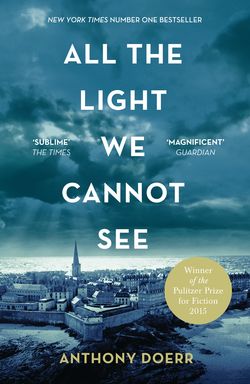Читать книгу All the Light We Cannot See - Anthony Doerr, Anthony Doerr - Страница 44
Down Six Flights
ОглавлениеThe roar of the bombers has hardly faded when an artillery shell whistles over the house and makes a dull crash as it explodes not far away. Objects patter onto the roof—shell fragments? cinders?—and Marie-Laure says aloud, “You are too high in the house,” and forces herself out from beneath the bed. Already she has lingered too long. She returns the stone inside the model house and restores the wooden panels that make up its roof and twists the chimney back into place and puts the house into the pocket of her dress.
Where are her shoes? She crawls around the floor, but her fingers feel only bits of wood and what might be shards of window glass. She finds her cane and goes in her stocking feet out the door and down the hall. The smell of smoke is stronger out here. The floor still cool, walls still cool. She relieves herself in the sixth-floor toilet and checks her instinct to flush, knowing the toilet will not refill, and double-checks the air to make sure it does not feel warm before continuing.
Six paces to the stairwell. A second shell screeches overhead, and Marie-Laure shrieks, and the chandelier above her head chimes as the shell detonates somewhere across the e stuary.
Rain of bricks, rain of pebbles, slower rain of soot. Eight curving stairs to the bottom; the second and fifth steps creak. Pivot around the newel, eight more stairs. Fourth floor. Third. Here she checks the trip wire her great-uncle built beneath the telephone table on the landing. The bell is suspended and the wire remains taut, running vertically through the hole he has drilled in the wall. No one has come or gone.
Eight paces down the hall into the third-floor bathroom. The bathtub is full. Things float in it, flakes of ceiling plaster, maybe, and there’s grit on the floor beneath her knees, but she puts her lips to its surface and drinks her fill. As much as she can.
Back to the stairwell and down to the second floor. Then the first: grapevines carved into the banister. The coatrack has toppled over. Fragments of something sharp are in the hall—crockery, she decides, from the hutch in the dining room—and she steps as lightly as she can.
Down here, some of the windows must have blown out as well: she smells more smoke. Her great-uncle’s wool coat hangs from the hook in the foyer; she puts it on. No sign of her shoes here either—what has she done with them? The kitchen is a welter of fallen shelves and pots. A cookbook lies facedown in her path like a shotgunned bird. In the cupboard, she finds a half-loaf of bread, what’s left from the day before.
Here, in the center of the floor, the cellar door with its metal ring. She slides aside the small dining table and heaves open the hatch.
Home of mice and damp and the stink of stranded shellfish, as if a huge tide swept in decades ago and took its time draining away. Marie-Laure hesitates over the open door, smelling the fires from outside and the clammy, almost opposite smell washing up from the bottom. Smoke: her great-uncle says it is a suspension of particles, billions of drifting carbon molecules. Bits of living rooms, cafés, trees. People.
A third artillery shell screams toward the city from the east. Again Marie-Laure feels for the model house in the pocket of her dress. Then she takes the bread and her cane and starts down the ladder and pulls the trapdoor shut.
